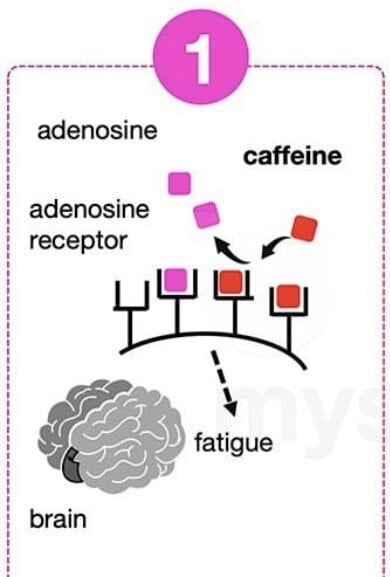I'm sure you've wondered whether your third cup of coffee in the morning will be enough to keep you awake at the office, or whether the one you have at 4 p.m. will prevent you from falling asleep tonight.
Coffee is an important part of daily life for most of us. It's a symbol of conviviality and social gathering, as well as being a well-known stimulant for our long working days. It seems that Balzac drank up to 50 cups of coffee a day to work on his manuscripts! But what's the truth?
Coffee: a concentration booster
The legend of coffee is said to be thousands of years old and has fascinated coffee lovers around the world for a very long time. According to legend, in the 9th century, a young shepherd noticed that his goats were more energetic and alert after eating the red berries of an unknown tree. Curious about this discovery, the young shepherd took the risk of tasting the berries himself. It is said that he felt a surge of energy and vitality.
Caffeine, the main stimulant in coffee, has a chemical structure similar to that of a molecule called adenosine. This molecule is produced naturally in the body and is responsible for feelings of fatigue when it binds to receptors in the brain. In other words, more adenosine means more fatigue. Due to the structural similarities between caffeine and adenosine, caffeine can prevent adenosine from binding to these receptors, thereby reducing feelings of fatigue. Caffeine also increases levels of neurotransmitters such as dopamine and noradrenaline, which are directly involved in the state of alertness.

Sources: mysportscience https://www.mysportscience.com/post/how-does-caffeine-work
While we know that in high doses caffeine can disrupt sleep and even cause anxiety, in moderate doses it has direct beneficial effects on our cognitive performance, mood, alertness, and attention. Recent studies have also shown that consuming 200 mg of caffeine (about two espressos) can increase concentration. [1, 2] This can effectively improve our productivity and efficiency.
Did you know? People who drink more coffee are less likely to suffer from depression. [3]
A treasure trove of antioxidants
In addition to its positive effects on brain function, coffee is considered one of the foods with the highest antioxidant activity in relation to the amount consumed.
Coffee contains polyphenols, which are organic molecules found in plant-based foods. These polyphenols are known for their antioxidant properties and play a role in protecting against environmental aggressors such as pollution, infections, and oxidative damage.
These antioxidants make up between 7 and 9% of the weight of a coffee bean, meaning that coffee lovers can consume up to 1g of polyphenols per day. [4, 5]
Good to know: drinking 3 to 5 cups of coffee a day can reduce the risk of all-cause mortality by 17% (19% for cardiovascular causes and 18% for cancer-related causes). [6]
Coffee break: a moment of conviviality
It is said that “coffee is the silent colleague that everyone appreciates.”
In addition to the physical health benefits of getting up and changing position regularly, taking a trip to the coffee machine is a great way to spend time with your colleagues. It allows you to take a break from your daily tasks and enjoy a moment of pleasure and relaxation over a good cup of coffee.

In short, when consumed in moderation, coffee can bring many benefits to your work by helping to improve your mood and efficiency.
Would you like another cup of coffee?
SOURCES
[1] van Dam, Rob M., et al. “Coffee, Caffeine, and Health.” New England Journal of Medicine, vol. 383, no. 4, July 2020, pp. 369–78, https://doi.org/10.1056/NEJMra1816604.
[2] Zabelina, Darya L., and Paul J. Silvia. “Percolating Ideas: The Effects of Caffeine on Creative Thinking and Problem Solving.” Consciousness and Cognition, vol. 79, Mar. 2020, p. 102899, https://doi.org/10.1016/j.concog.2020.102899.
[3]Grosso, Giuseppe, et al. “Coffee, Tea, Caffeine and Risk of Depression: A Systematic Review and Dose–Response Meta-Analysis of Observational Studies.” Molecular Nutrition & Food Research, vol. 60, no. 1, 2016, pp. 223–34, https://doi.org/10.1002/mnfr.201500620.
[4] Ding, Ming, et al. “Caffeinated and Decaffeinated Coffee Consumption and Risk of Type 2 Diabetes: A Systematic Review and a Dose-Response Meta-Analysis.” Diabetes Care, vol. 37, no. 2, Feb. 2014, pp. 569–86, https://doi.org/10.2337/dc13-1203.
[5] Kennedy, Oliver John, et al. “Coffee, Including Caffeinated and Decaffeinated Coffee, and the Risk of Hepatocellular Carcinoma: A Systematic Review and Dose–Response Meta-Analysis.” BMJ Open, vol. 7, no. 5, 2017, p. e013739, https://doi.org/10.1136/bmjopen-2016-013739.
[6]Poole, Robin, et al. “Coffee Consumption and Health: Umbrella Review of Meta-Analyses of Multiple Health Outcomes.” BMJ, vol. 359, Nov. 2017, p. j5024, https://doi.org/10.1136/bmj.j5024.